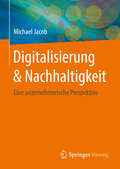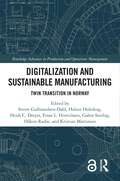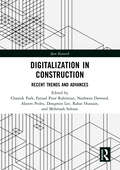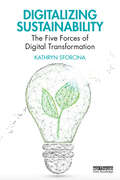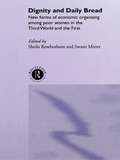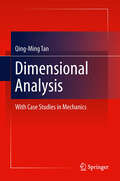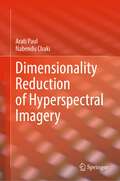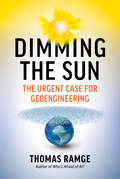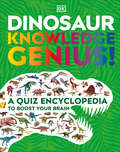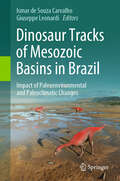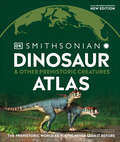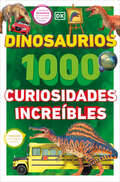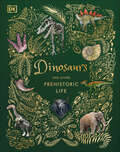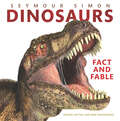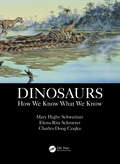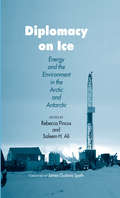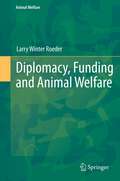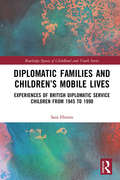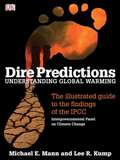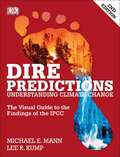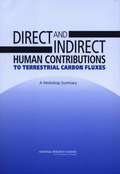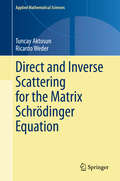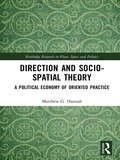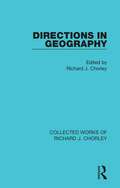- Table View
- List View
Digitalisierung & Nachhaltigkeit: Eine unternehmerische Perspektive
by Michael JacobDie Themen Digitalisierung und Nachhaltigkeit dominieren die Zukunft von Unternehmen und unserer Gesellschaft in den nächsten Jahrzehnten. Wenn Unternehmen die Digitalisierung aktiv umsetzen, müssen sie folglich ökonomische, ökologische und soziale Aspekte im Sinne der Nachhaltigkeit berücksichtigen. Genau hier setzt Michael Jacob an: Der Autor geht im ersten Teil des Buches auf die Grundlagen der Digitalisierung und Nachhaltigkeit anhand der wichtigsten Modelle ein. Im zweiten Teil wird der Fokus auf die Frage gelegt, wie Unternehmen den Digitalisierungsprozess nachhaltig gestalten können. Ein kurzes Fazit rundet die beiden Hauptteile ab.Damit ist das Buch ein wichtiges Hilfsmittel, um Zielkonflikte zwischen den Bereichen Digitalisierung und Nachhaltigkeit zunächst zu erkennen und dann entsprechend entscheiden zu können. Somit können Unternehmen ihrer gesellschaftlichen Verantwortung (Corporate Social Responsibility) nachkommen. Ein Buch für alle, die eine kompakte Einführung in die beiden großen Themen unserer Zeit suchen.
Digitalization and Sustainable Manufacturing: Twin Transition in Norway (Routledge Advances in Production and Operations Management)
by Halvor Holtskog Kristian Martinsen Sverre Gulbrandsen-Dahl Heidi C. Dreyer Einar L. Hinrichsen Håkon Raabe Gabor SziebigThe manufacturing industry is facing massive changes driven by digitalization and sustainability. It is being redefined to meet the UN SDGs with the creation of new materials, processes and machinery. The drive for digitalization in order to use resources more effectively and efficiently adds to the complexity of this twin transition. This book presents results from 8 years of research with 15 industry partners, following the transition towards a digitalized industry 4.0 manufacturing and sustainable manufacturing paradigm.The selected chapters demonstrate how globally competitive manufacturing in high-cost countries such as Norway is enabled by AI-supported intelligent and flexible automation and the use of digital twins, as well as human-centred manufacturing. This book describes the interactions in innovative and sustainable organizations and changes in materials, products and processes, digital twins and AI-supported automated manufacturing processes. Supported by case studies and reflections from the manufacturing industry, this book evaluates how the combination of digitalization and sustainability enables competitiveness. With a focus on multi-material products and processes, robust and flexible automation and innovative and sustainable organizations, it provides a multi-disciplinary insight into the challenges and opportunities faced by manufacturing industries over time.This book serves as an ideal reference for researchers, scholars and policymakers in manufacturing, production and operations, with a particular interest in technology and sustainability.
Digitalization in Construction: Recent trends and advances (Spon Research)
by Farzad Pour Rahimian Nashwan Dawood Chansik Park Akeem Pedro Rahat Hussain Mehrtash Soltani Dongmin LeeThis book highlights the latest trends and advances in applications of digital technologies in construction engineering and management. A collection of chapters is presented, explicating how advanced technological solutions can innovatively address challenges and improve outcomes in the construction industry. Promising technologies that are highlighted include digital twins, virtual reality, augmented reality, artificial intelligence, robotics, blockchain, and distributed ledger technologies. The first section presents recent applications of extended reality technologies for construction education and advanced project control. The subsequent chapters explore Artificial Intelligence (AI), blockchain, and BIM-enabled digitalization in construction through a series of case studies, reviews, and technical studies. Innovative technologies and digitalized solutions are proposed for improved design, planning, training, monitoring, inspection, and operations management in Architectural, Engineering and Construction (AEC) contexts. In addition to the technological perspectives and insights presented, pressing issues such as decarbonization, safety, and sustainability in the built environment are also discussed. This book provides foundational knowledge and in-depth technical studies on emerging technologies for students, academics, and industry practitioners. The research demonstrates how the effective use of new technologies can enhance work methods, transform organizational structures, and bring profound advantages to construction project participants.
Digitalizing Sustainability: The Five Forces of Digital Transformation
by Kathryn SforcinaDigitalizing Sustainability outlines why ‘business as usual’ isn't working and sets out five Transformational Forces which can be used to innovate and scale sustainability solutions using digital means. This transformation will be powered by a range of digital technologies that have the potential to ideate, propel and scale sustainability solutions in an exponential manner over the next decade. This book introduces the Five Forces of Digital Transformation. These forces all share a common root – they are powered by digital technologies that enable them to operate at the speed and scale that we need to achieve global transformation for people and planet. Working together, these forces help overcome many of the barriers and pitfalls that humanity has faced in trying to achieve sustainability 2.0 and will help you tackle these questions: Why has sustainability 1.0 failed us? What are the bugs and bad code in our operating systems that we must address to have any hope of creating a sustainable civilization? What are the Five Forces of Digital Transformation that will forge a sustainable and resilient future for our people and planet? What are the core priorities going forward for coalitions of the willing to harness these forces for sustainability and resilience? Disruptive and innovative, this book provides readers with a clear path forward to a sustainable digital future. It will be of great interest to anyone interested in the adoption of digital technologies for driving solutions to global sustainability challenges.
Dignity and Daily Bread: New Forms of Economic Organization Among Poor Women in the Third World and the First
by Sheila Rowbotham Swasti MitterFirst published in 1993. Routledge is an imprint of Taylor & Francis, an informa company.
Dimensional Analysis
by Qing-Ming TanDimensional analysis is an essential scientific method and a powerful tool for solving problems in physics and engineering. This book starts by introducing the Pi Theorem, which is the theoretical foundation of dimensional analysis. It also provides ample and detailed examples of how dimensional analysis is applied to solving problems in various branches of mechanics. The book covers the extensive findings on explosion mechanics and impact dynamics contributed by the author's research group over the past forty years at the Chinese Academy of Sciences. The book is intended for research scientists and engineers working in the fields of physics and engineering, as well as graduate students and advanced undergraduates of the related fields. Qing-Ming Tan is a former Professor at the Institute of Mechanics, the Chinese Academy of Sciences, China.
Dimensionality Reduction of Hyperspectral Imagery
by Nabendu Chaki Arati PaulThis book provides information about different types of dimensionality reduction (DR) methods and their effectiveness in hyperspectral data processing. The authors first explain how hyperspectral imagery (HSI) plays an important role in remote sensing due to its high spectral resolution that enables better identification of different materials on the earth’s surface. The authors go on to describe potential challenges due to HSI being acquired in hundreds of narrow and contiguous bands, represented as a 3-dimensional image cube, often causing the bands to contain information redundancy. They then show how processing a large number of bands adds challenges in terms of computation complexity that reduces efficiency. The authors then present how DR is an essential step in hyperspectral data analysis to solve these issues. Overall, the book helps readers understand the DR processes and its impact in effective HSI analysis.
Dimming the Sun: The Urgent Case for Geoengineering
by Thomas RamgeA groundbreaking, vital examination of a powerful—and extremely controversial—stopgap solution to looming climate catastrophe “It would be great if humanity could forgo solar geoengineering and get climate change under control before the world goes off the rails. But I no longer believe in this possibility.” Earth stands at a tipping point. As we fail to curtail emissions fast enough, our planet stares down a cascade of imminent, catastrophic, and irreversible disaster triggered by climate change. Yet a potent technology already exists to buy us more time: solar geoengineering. Through methods such as atmospheric aerosols, human-generated cirrus clouds, and solar sails, we humans can—at least in the short term—slow the Earth’s warming. Should we? Award-winning science writer Thomas Ramge’s Dimming the Sun is his provocative, informative, urgent, and necessary exploration of this intriguing stopgap solution. Ramge shows us how the science works, what the risks are—both geophysical and political—and how the international community might come together to agree on and regulate a safe and effective plan for geoengineering. And while he identifies the unknowns about the technology that remain, he believes this very uncertainty demands our full attention. With time to avert the worst of climate change rapidly running out, he makes a forceful case that the most responsible course of action is to dramatically increase research on solar geoengineering now—before it’s too late.
Dinosaur Knowledge Genius: A Quiz Encyclopedia to Boost Your Brain (DK Knowledge Genius)
by DKPut your dinosaur knowledge to the test with this brilliant quiz book for kids!Introducing Dinosaur Knowledge Genius! - a brilliant quiz book packed with over 80 topics on the fascinating prehistoric world of dinosaurs. Which were the most fearsome predators? How big were the most gigantic plant-eaters? Why did so many dinosaurs have frills, crests, or spikes? Did dinosaurs really lay eggs? Which ones had feathers? If you want to know the answers, then this may be the book for you! Take on this brain-busting challenge about prehistoric life.This dinosaur quiz book for children aged 9-12 offers: - Plenty of quiz questions throughout the book to put your knowledge to the test.- Interactive &“Test Yourself&” panel lists with three levels of difficulty - starter, challenger, and genius.- Impressive dinosaur graphics that jump out at you on every page.- A variety of fun facts, picture puzzles, and quiz questions to keep kids entertained and engaged.As you hop from one dinosaur species to the next, you will learn all about the fascinating prehistoric world in this entertaining quiz book for kids and the whole family to enjoy. The pages are packed with eye-popping pictures and the "Test Yourself" panels list the type of dinosaur you&’re looking for on the page. With three levels of difficulty, the challenge gets harder from Starter to Challenger and the truly tricky Genius category. There's a fun fact with every picture to give a helpful clue.At DK, we believe in the power of discovery. So why stop here? Why not put your general knowledge to the test with other books in the Knowledge Genius series? Try General Knowledge Genius! to learn about everything, explore the animal world with Animal Knowledge Genius! or explore our planet with Earth Knowledge Genius!
Dinosaur Tracks of Mesozoic Basins in Brazil: Impact of Paleoenvironmental and Paleoclimatic Changes
by Giuseppe Leonardi Ismar de Souza CarvalhoThis book presents the diversity of Dinosaur tracks found in Mesozoic basins in Brazil and brings it in a paleoenvironmental context. Each chapter includes information about the geology of the site, the distribution of the footprints, their diversity as well as a paleontological interpretation. The book provides information about the paleoenvironmental and paleoclimatic aspects of the Mesozoic. All chapters contain a geological map, images of the footprints and dinosaur tracks and a reconstruction of the environment in which the tracks were found. The book is aimed at geoscientists and paleontologists, including researchers which focus on evolution subjects.
Dinosaur and Other Prehistoric Creatures Atlas (DK Where on Earth? Atlases)
by DKWho&’s ready for a round-the-world trip of epic dinosaur proportions? Pack your bags, and let&’s go!On this adventure, you&’ll travel back in time to see more than 40 dinosaurs come to life! The geography book for kids explores each continent, revealing fossil sites and stories on every map. A unique children&’s atlas that brings weird and wonderful prehistoric animals into your living room! It includes: • Each chapter explores a continent, showing where dinosaurs appeared at a given time. • Connects each dinosaur to a period — Triassic, Jurassic or Cretaceous. • Specially commissioned maps and 3D locator globes link the prehistoric world to the present-day. • Stunning double-page spreads show dinosaurs and other prehistoric animals in dynamic scenes. • Perfect for children ages 9 and up who want to know more about dinosaurs, ice age animals and other prehistoric creatures. • A face-to-face experience with fearsome dinosaurs! Inside the pages of this children&’s educational book, you&’ll get to stare down a T-Rex in North America, watch out for Velociraptors' slashing claws in the Gobi Desert and trek across the Siberian tundra! You&’ll also discover the answers to fascinating questions about dinosaurs. Which plant-eater weighed as much as five elephants? Where was mighty Tyrannosaurus the ultimate hunter?Using specially commissioned maps, the dinosaur atlas for kids reveal the prehistoric world as never before! A modern 3D globe next to each map helps you understand the arrangement of the continents over time and why paleontologists find fossils where they do. The fully updated edition includes the most up-to-date theories and discoveries of dinosaur science, alongside stunning CGI illustrations and maps of all the major fossil sites around the world.Dinosaur and Other Prehistoric Creatures Atlas is so much more than just a book filled with cool maps, stats and fun facts for kids, it&’s also a vital source of learning — perfect for children to dip into for school projects! Look out for more titles in this series from DK. Discover planet Earth as you've never seen it before in What's Where on Earth?
Dinosaurios: 1000 curiosidades increíble (1,000 Amazing Dinosaurs Facts)
by DKDescubre fascinantes datos y curiosidades sobre los animales que habitaron la Tierra hace millones de años y sorprende a tus amigos y familia.¿Sabías que el dinosaurio más grande que ha existido media tanto como cuatro camiones de bomberos uno detrás de otro? ¿O que el más pequeño pesaba menos que una cucharita de azúcar? ¿Quieres saber cuánto medían las alas del reptil volador más grande jamás descubierto? Sumérgete en las páginas de este divertido libro sobre dinosaurios y descubre todo sobre estas criaturas prehistóricas: cuánto medían las garras del Therizinosaurus, qué dinosaurio tenía el cerebro más pequeño, cuál tenía los dientas más afilados y ¡mucho más!El regalo perfecto para saciar el apetito de saber de los niños de un modo divertido: - Contiene más de 1000 curiosidades en formato de pregunta y respuesta.- Escrito de forma clara, con explicaciones entretenidas e impresionantes imágenes generadas por ordenador.- Con estadísticas alucinantes explicadas por medio gráficos y comparaciones visuales para entender los datos de forma fácil.Un divertido libro ilustrado para niños de 9 años o más, repleto de sorpresas y curiosidades alucinantes para que los jóvenes lectores descubran el maravilloso mundo de los dinosaurios.------------------------------------------Astonish your friends and family with this incredible collection of mind-boggling facts about the scariest animals ever to walk the Earth.Did you know that the largest dinosaur was four times longer than a fire engine but its babies were the size of geese? Or that the smallest dinosaur weighed less than a teaspoon of sugar? Or that the largest flying reptile was as tall as a giraffe with wings the size of a fighter jet? This fascinating first dinosaur book for kids is packed with bite-size nuggets of unbelievable information. Find out which dinosaur had the sharpest teeth, the longest claw and the smallest brain.Dive into the pages of this kids dinosaur book to discover: - 1,000 jaw-dropping, mind-blowing facts to wow your family and friends.- Stunning CGI images to convey statistics in an intuitive way that kids can understand.- Factfile spreads are packed with infographics and key facts on all kinds of prehistoric life.- Photo stories feature the world's spectacular fossils, from dinosaur footprints and nests to complete skeletons.- Fun, accessible text written to excite and entertain children and adults alike.Discover the fastest, the slowest, the deadliest, and the downright weirdest dinosaurs ever to roam the planet, in this dinosaur gift book for children aged 9+.
Dinosaurs and Other Prehistoric Life (DK Children's Anthologies)
by Professor Anusuya Chinsamy-TuranA comprehensive pocket guide to dinosaurs and prehistoric animals and the world they inhabited millions of years ago. Packed with more than seven hundred full-color illustrations, this definitive pocket guide paints a vivid portrait of extraordinary dinosaurs and prehistoric animals, and the ecosystems they lived in millions of years ago. This guide features authoritative text, crystal-clear illustrations, and a straightforward approach to revealing the fascinating lives and habitats of dinosaurs, pterosaurs, marine reptiles, and prehistoric beasts. The introductory section explains classification systems, geological timelines, the evolution of the dinosaurs, and how fossils form and are discovered by paleontologists. For ease of reference, the main body of the book is divided into three sections: the Precambrian and Paleozoic eras, when animals first began evolving; the Mesozoic era, which saw the flourishing and eventual extinction of the dinosaurs; and the Cenozoic era, when giant mammals walked the Earth. Each section is broken down into its geological time periods, and, within these, the species are organized according to habitat--whether they lived on land, in the water, or in the air.There are detailed profiles of 200 dinosaurs and other ancestors of modern animals. Each entry combines a precise, jargon-free description with full-color illustrations, skeletons, and replica models, annotated to showcase the unique features of the species. Maps show where each animal's fossils have been found, and many profiles are supported by photographs to show actual excavation sites.
Dinosaurs: Fact and Fable
by Seymour Simon“If you love dinosaurs, you’ll love this book."— Steve Brusatte, paleontologist at the University of Edinburgh and New York Times bestselling author of The Rise and Fall of the DinosaursJoin award-winning science writer Seymour Simon as he separates fact from fiction in a brilliant exploration of some of the most fascinating creatures to ever roam the planet: dinosaurs! This nonfiction picture book is an excellent choice for both shared and independent reading during homeschooling and classroom learning, in particular for children ages 6 to 8.Scientists have dug up and uncovered many facts about dinosaurs—and in the process, they have come across many myths. This picture book digs deep into the Age of Dinosaurs, covering topics such as fossilization, plate tectonics, dinosaur diets, paleontology, extinction theories, dinosaur relatives, and more!Get ready to learn what we know about dinosaurs and what we still don’t know, and about the amazing new discoveries being made every single day.Perfect for young scholars’ school reports, Dinosaurs: Fact and Fable features clear text, vibrantly colored pages, engaging sidebars, and stunning full-color illustrations and photographs. This book includes an author's note, a glossary, a timeline, and an index and supports the Common Core State Standards.Check out these other Seymour Simon books about animals:Big CatsButterfliesCatsCrocodiles & AlligatorsDogsDolphinsElephantsFrogsGorillasHorsesInsectsPenguinsSea CreaturesSnakesSpidersWhalesWild BabiesWolves
Dinosaurs: How We Know What We Know
by Mary Higby Schweitzer Elena Rita Schroeter Charles Doug CzajkaThis textbook introduces research on dinosaurs by describing the science behind how we know what we know about dinosaurs. A wide range of topics is covered, from fossils and taphonomy to dinosaur physiology, evolution, and extinction. In addition, sedimentology, paleo-tectonics, and non-dinosaurian Mesozoic life are discussed. There is a special opportunity to capitalize on the enthusiasm for dinosaurs that students bring to classrooms to foster a deeper engagement in all sciences. Students are encouraged to synthesize information, employ critical thinking, construct hypotheses, devise methods to test these hypotheses, and come to new defensible conclusions, just as paleontologists do. Key Features Clear and easy to read dinosaur text with well-defined terminology Over 600 images and diagrams to illustrate concepts and aid learning Reading objectives for each chapter section to guide conceptual learning and encourage active reading Companion website (teachingdinosaurs.com) that includes supporting materials such as in-class activities, question banks, lists of suggested specimens, and more to encourage student participation and active learning Ending each chapter with a specific "What We Don’t Know" section to encourage student curiosity Related Titles Singer, R. Encyclopedia of Paleontology (ISBN 978-1-884964-96-1) Fiorillo, A. R. Alaska Dinosaurs: An Ancient Arctic World (ISBN 978-1-138-06087-6) Caldwell, M. W. The Origin of Snakes: Morphology and the Fossil Record (ISBN 978-1-4822-5134-0)
Diplomacy on Ice
by James Gustave Speth Rebecca H Pincus Saleem H AliAs the race for resources in distant parts of the planet gathers momentum, most discussion has centered on the potential for conflict, environmental destruction, and upheaval from climate change. This important book shifts the conversation about the Arctic and Antarctic from conflict to cooperation. A multidisciplinary roster of experts provides fresh views of the polar regions, focusing on diplomacy and the potential for cooperative international decision-making. Collectively the contributors illustrate the breadth of issues that complicate governance in the Arctic and Antarctic, as well as parallels and differences between the politics of the two poles.
Diplomacy, Funding and Animal Welfare
by Larry Winter Roeder Jr.Diplomacy, Funding and Animal Welfare is a practical guide to the best diplomatic and negotiation practices needed to convince governments and international institutions to effectively protect animals, which also introduces new approaches to fundraising. Animal protection advocates are prepared for speaking to diplomats and government officials in any setting, and to combatants in war zones. The book mainly focuses on approaching local and national governments, the United Nations system, the international Red Cross movement and systems related to other international organizations that can help animals, often in surprising ways. The reader will learn the rules of "diplomatic protocol", and much about the rules and procedures of major international bodies. To provide balance and real world relevance, the guide draws on a compilation of the author's extensive activities across a range of development, animal welfare, emergency management and climate issues in government and in the NGO world, as well as interviews with scholars and officials from NGOs, diplomatic missions, the United Nations, the Red Cross, governments and corporations.
Diplomatic Families and Children’s Mobile Lives: Experiences of British Diplomatic Service Children from 1945 to 1990 (Routledge Spaces of Childhood and Youth Series)
by Sara HiornsThis book is the first of its kind: a historical inquiry into the family life of British diplomats between 1945 and 1990. It examines the ways in which the British Diplomatic Service reacted to and were influenced by the radical social changes that took place in Britain during the latter half of the twentieth century. It asks to what extent diplomats, who strove to protect their enclosed and elite circles, were suitable to represent this changing nation. Drawing on previously unseen primary sources and interview testimony, this book explores themes of societal change, end of empire, second wave feminism, new approaches to childcare, and developments in the civil service. It explores questions of belonging and identity, as well as enduring perceptions of this organisation that is (often mistakenly) understood to be quintessentially 'British'. Offering new and fresh insights, this book will be of interest to students and scholars in history, historical geography, political studies, sociology, feminist studies and cultural studies.
Dire Predictions
by Michael Mann Lee R. KumpInformation on global climate change drawn from the Fourth Assessment Report of the Intergovernmental Panel on Climate Change (IPCC).
Dire Predictions: Understanding Climate Change (Second Edition)
by Lee R. Kump Dorling Kindersley Publishing Staff Michael E. MannExplore global warming with graphics, illustrations, and charts that separate climate change fact from fiction, presenting the truth about global warming in a way that's both accurate and easy to understand. Respected climate scientists Michael E. Mann and Lee R. Kump address important questions about global warming and climate change, diving into the information documented by the IPCC (Intergovernmental Panel on Climate Change) and breaking it down into clear graphics that explain complex climate questions in simple illustrations that present the truth of the global warming problem clearly. These experts take scientific findings about climate change and global warming and use analogies, striking images, and understandable graphics to make the global warming question clear to both skeptics and scientists. Dire Predictions shows the evidence and the causes that respected scientists have documented in IPCC findings and climate change studies -- this powerful, illustrated book is updated with the latest IPCC information and is a must-read for anyone interested in understanding global warming and climate change and in joining the debate over the best way to combat global warming.
Direct Action: Memoirs of an Urban Guerrilla
by Ann HansenAnn Hansen stood trial as one of the so-called “Squamish Five.” Sentenced to life in prison, she served seven years. Now she tells her story for the first time. Direct Action captures the excitement and indignation of the counterculture of the early ’80s. Missile tests were fuelling a new arms race. Reckless megaprojects threatened the global environment. Alienation, punk rock, and militancy were on the rise. Hansen and her fellow urban guerrillas believed that sabotaging government and corporate property could help turn things around. To prove their point, they bombed the Litton Systems plant in Toronto, where components for Cruise Missiles were being made. Hansen’s book poses unresolved ethical dilemmas. In light of the recent explosion of anti-globalization protests, Direct Action mirrors the resurgence of militant activity around the world.
Direct and Indirect Human Contributions to Terrestrial Carbon Fluxes: A Workshop Summary
by Stephanie Johnson Rob CoppockHuman-induced climate change is an important environmental issue worldwide, as scientific studies increasingly demonstrate that human activities are changing the Earth’s climate. Even if dramatic reductions in emissions were made today, some human-induced changes are likely to persist beyond the 21st century. The Kyoto Protocol calls for emissions reporting that separates out management-induced changes in greenhouse gases from those changes caused by indirect human effects (e.g., carbon dioxide fertilization, nitrogen deposition, or precipitation changes), natural effects, and past practices on forested agricultural lands.This book summarizes a September 2003 workshop where leaders from academia, government and industry came together to discuss the current state of scientific understanding on quantifying direct human-induced change in terrestrial carbon stocks and related changes in greenhouse gas emissions and distinguishing these changes from those caused by indirect and natural effects.
Direct and Inverse Scattering for the Matrix Schrödinger Equation (Applied Mathematical Sciences #203)
by Tuncay Aktosun Ricardo WederAuthored by two experts in the field who have been long-time collaborators, this monograph treats the scattering and inverse scattering problems for the matrix Schrödinger equation on the half line with the general selfadjoint boundary condition. The existence, uniqueness, construction, and characterization aspects are treated with mathematical rigor, and physical insight is provided to make the material accessible to mathematicians, physicists, engineers, and applied scientists with an interest in scattering and inverse scattering. The material presented is expected to be useful to beginners as well as experts in the field. The subject matter covered is expected to be interesting to a wide range of researchers including those working in quantum graphs and scattering on graphs. The theory presented is illustrated with various explicit examples to improve the understanding of scattering and inverse scattering problems. The monograph introduces a specific class of input data sets consisting of a potential and a boundary condition and a specific class of scattering data sets consisting of a scattering matrix and bound-state information. The important problem of the characterization is solved by establishing a one-to-one correspondence between the two aforementioned classes. The characterization result is formulated in various equivalent forms, providing insight and allowing a comparison of different techniques used to solve the inverse scattering problem. The past literature treated the type of boundary condition as a part of the scattering data used as input to recover the potential. This monograph provides a proper formulation of the inverse scattering problem where the type of boundary condition is no longer a part of the scattering data set, but rather both the potential and the type of boundary condition are recovered from the scattering data set.
Direction and Socio-spatial Theory: A Political Economy of Oriented Practice (Routledge Research in Place, Space and Politics)
by Matthew G. HannahThe embodied directedness of human practice has long been neglected in critical socio-spatial theory, in favor of analyses focused upon distance and proximity. This book illustrates the absence of a sense for direction in much theoretical discourse and lays important groundwork for redressing this lacuna in socio-spatial theory. Many accounts of the social world are incomplete, or are increasingly out of step with recent developments of neoliberal capitalism. Not least through new technological mediations of production and consumption, the much-discussed waning of the importance of physical distance has been matched by the increasing centrality of turning from one thing to another as a basic way in which lives are structured and occupied. A sensibility for embodied processes of turning, and for phenomena of direction more generally, is urgently needed. Chapters develop wide-ranging and original engagements with the arguments of Sara Ahmed, Jonathan Beller, Edmund Husserl, Martin Heidegger, Virginia Held, Bernard Stiegler, Theodore Schatzki, Rahel Jaeggi, Hartmut Rosa and David Harvey. This book reinterprets practice, embodiment, alienation, reification, social reproduction and ethical responsibility from a directional perspective. It will be a new valuable resource and reference for political and social geography students, as well as sociologists and anthropologists.
Directions in Geography (Collected Works of Richard J. Chorley)
by Richard J. ChorleyOriginally published in 1973. This collection of essays looks at the ‘quantitative revolution’ and the ‘new geography’ by some of the geographers who had a significant part in those innovations and looks ahead to further developments. The views in the chapters are diverse and offer a fascinating glimpse of the discipline of geography as the subject was undergoing such change and becoming more socially committed. They cover theory, spatial-systems theory, forecasting, human ecology and climatology alongside the teaching of the subject. The concerns of the contemporary geographer come across and are of interest today as these areas have developed still more.
